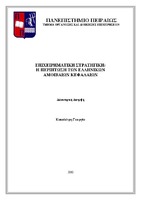Επιχειρηματική στρατηγική: η περίπτωση των ελληνικών αμοιβαίων κεφαλαίων
Corporate strategy: the case of Greek mutual funds

Προβολή/
Θεματική επικεφαλίδα
Διαχείριση κινδύνου ; Αμοιβαία κεφάλαιαΠερίληψη
Η παρούσα διδακτορική διατριβή μελετά τον σημαντικότερο, ίσως, παράγοντα της Επιχειρηματικής Στρατηγικής (πέρα από τη χρηματική επάρκεια) των μεγάλων Ελληνικών Εταιρειών Αμοιβαίων Κεφαλαίων, δηλαδή το Ανθρώπινο Δυναμικό, δεδομένου ότι η επισκόπηση της βιβλιογραφίας κατέδειξε την απουσία, γενικά, ερευνών που να μελετούν διεξοδικά το προφίλ συμπεριφοράς των εργαζόμενων του κλάδου των Αμοιβαίων Κεφαλαίων. Η επιδίωξη της μελέτης ήταν να καλύψει, εν μέρει, το κενό αυτό, εξετάζοντας τη συμπεριφορά των εργαζόμενων στις 3 μεγαλύτερες Ελληνικές Ανώνυμες Εταιρείες Διαχειρίσεως Αμοιβαίων Κεφαλαίων (Α.Ε.Δ.Α.Κ.) που καλύπτουν συνολικά, περίπου, το 80% της Ελληνικής Αγοράς. Για το σκοπό αυτό αναπτύχθηκε μια συνδυασμένη εφαρμογή δύο ερευνητικών εργαλείων και με τη βοήθεια της Παραγοντικής Ανάλυσης προσδιορίστηκαν πέντε Παράγοντες - Τύποι Συμπεριφορών: (1) Δυναμικός (2) Κοινωνικός (3) Τυπικός (4) Υποστηρικτικός (5) Ορθολογικός Οι 3 υπό ανάλυση Α.Ε.Δ.Α.Κ. (οι οποίες, σημειωτέον, έχουν όλες ισοδύναμο περίπου μερίδιο Αγοράς) απεδείχθη ότι δεν διαφοροποιούνται στην πλειοψηφία των Παραγόντων (1-4). Επιπλέον, βρέθηκε ότι το προσωπικό/ δημογραφικό προφίλ των εργαζομένων (φύλο, οικογενειακή κατάσταση, ηλικία, ίδρυμα αποφοίτησης, τμήμα αποφοίτησης, χρόνος απασχόλησης στην εταιρεία και συνολικά χρόνια εργασιακής εμπειρίας), δεν επηρεάζει τη συμπεριφορά τους. Τέλος, επαληθεύθηκε η υπόθεση ότι τα άτομα που εργάζονται σε ίδιο τμήμα παρουσιάζουν διαφοροποιημένες συμπεριφορές από αυτές των εργαζομένων σε τμήματα διαφορετικού εργασιακού αντικειμένου - ανεξάρτητα από την Επιχείρηση που ανήκουν, καθώς εμφανίστηκε στατιστικά σημαντική διαφορά στους 3 από τους 5 παράγοντες της Παραγοντικής Ανάλυσης.


